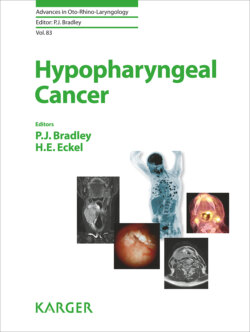Читать книгу Hypopharyngeal Cancer - Группа авторов - Страница 24
На сайте Литреса книга снята с продажи.
Prevention
ОглавлениеHead and neck cancer incidence including hypopharyngeal cancer trends over time and across countries are strongly influenced by patterns of tobacco or the joint effect of tobacco and alcohol use [80, 81]. There is a need for major potentially modifiable lifestyle factors, such as tobacco consumptions and alcohol, to be recognised and prevented by control of these modifiable factors, the major cause associated with hypopharyngeal cancer [82]. The USA Surgeon General’s report in 1964 identified tobacco as a causal agent for lung cancer, and this was followed by a public health effort from the mid 1960 to 2011 after which smoking prevalent has declined among men and women, and resulted in a decline of head and neck cancer in the 1990s, with a time interval of 30 years or more. This public health agenda was followed by several of the developed countries such as Canada, the United Kingdom, Australia and others. The global patterns of tobacco usage are more heterogeneous. Many of the less economically developed countries are in the early stages of the tobacco epidemic, with high smoking prevalence rates. Nearly 80% of the world’s more than 1 billion smokers live in low-and middle-income countries where the burden of tobacco-related illness and death is heaviest [83] In 2007, the World Health Assembly World Health Organisation (WHO) passed a resolution adapted by the Global Oral Health Program emphasising the need to include the prevention of oral cancer as an integral part of national cancer control programs in the detection, early diagnosis and treatment [83]. The WHO then become committed to fighting the Global Tobacco Epidemic by setting up the Framework Convention on Tobacco Control in 2005 and a Global Strategy to reduce the harmful effects of alcohol commenced in 2010 [84].
Many countries have implemented WHO recommendations to establish public policies for both tobacco and alcohol [85–87]. Consequently, the universal implementation of these policies is likely to reduce the incidence and mortality of head and neck cancer in the future.
